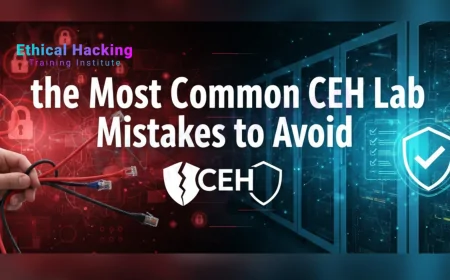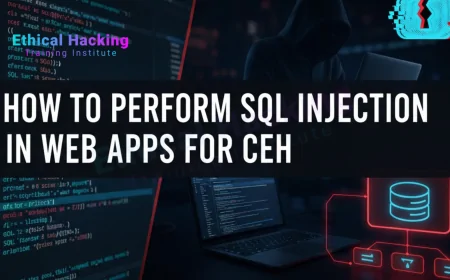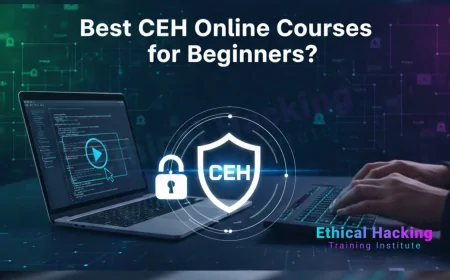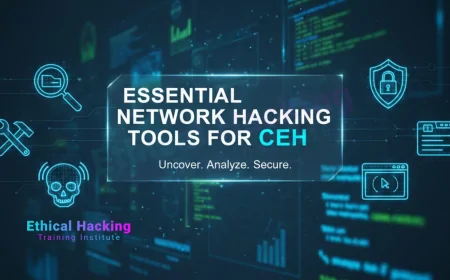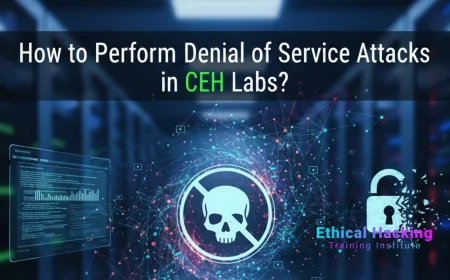How to Become a Certified Hacking Forensic Investigator (CHFI) and Secure Your Career | Certified Hacking Forensic Investigator: How to Get Started and Succeed
Learn how to become a Certified Hacking Forensic Investigator (CHFI). Discover CHFI eligibility, syllabus, exam details, salary scope, and job roles in cybersecurity and digital forensics. Secure your future with CHFI certification.
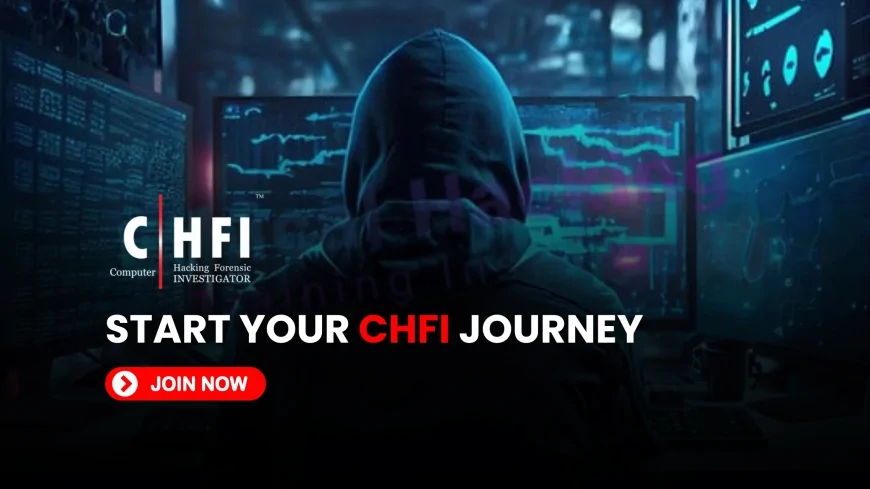
Table of Contents
- Introduction
- What is CHFI Certification?
- Why Choose CHFI for Your Career?
- Eligibility Criteria for CHFI
- CHFI Exam Structure and Details
- CHFI v10 Syllabus Breakdown
- Best Study Resources and Prep Tips
- CHFI vs Other Cybersecurity Certifications
- Career Opportunities After CHFI
- Salary Expectation for CHFI Certified Professionals
- Job Roles You Can Target with CHFI
- Real-World Applications of CHFI
- Tips to Succeed in the CHFI Exam
- CHFI Cost and Renewal Information
- Online vs Offline CHFI Training
- CHFI Certification Roadmap
- Common Mistakes to Avoid
- Testimonials and Success Stories
- FAQs
- Conclusion
Introduction
In today’s world, where cybercrime is rapidly evolving, digital forensics has become a critical pillar of cybersecurity. The Certified Hacking Forensic Investigator (CHFI) certification by EC-Council empowers IT professionals with skills to investigate cyberattacks, gather legal evidence, and secure digital infrastructure. This guide outlines every step you need to take to become a certified CHFI and secure a promising cybersecurity career.
What is CHFI Certification?
The CHFI is a vendor-neutral certification program designed to train cybersecurity professionals in the art of digital forensics and cyber investigation. The course teaches how to gather, analyze, and present digital evidence, often for use in legal proceedings. This includes everything from data breaches, corporate espionage, financial frauds, to cyberstalking incidents.
Why Choose CHFI for Your Career?
- High global recognition in legal and corporate sectors.
- Bridges the gap between cybersecurity and legal frameworks.
- Prepares professionals for advanced cybercrime investigations.
- Increases employability in law enforcement, IT forensics firms, and security consultancies.
Eligibility Criteria for CHFI
There are two ways to qualify:
- Attend official EC-Council training (no eligibility exam needed).
- Self-study candidates must have at least 2 years of information security experience and submit an eligibility application.
CHFI Exam Structure and Details
- Exam Code: 312-49
- Format: Multiple choice questions
- Number of Questions: 150
- Duration: 4 hours
- Passing Score: Varies (typically ~70%)
CHFI v10 Syllabus Breakdown
The CHFI v10 curriculum includes 14 comprehensive modules:
- Computer Forensics in Today’s World
- Investigation Processes
- Understanding Hard Disks and File Systems
- Data Acquisition and Duplication
- Defeating Anti-Forensics Techniques
- Operating System Forensics (Windows, Linux, Mac)
- Network Forensics
- Database Forensics
- Cloud Forensics
- Malware and Email Investigations
- Mobile Forensics
- IoT and Web Application Forensics
- Dark Web and Cryptocurrency Forensics
- Report Writing and Expert Witnessing
Best Study Resources and Prep Tips
- EC-Council official courseware and eBooks
- CHFI v10 practice exams and labs
- Virtual labs (CyberQ, InfoSec Institute, etc.)
- YouTube channels and cybersecurity forums
CHFI vs Other Cybersecurity Certifications
Cybersecurity certifications vary widely based on focus areas such as penetration testing, risk management, governance, or digital forensics. While the Certified Hacking Forensic Investigator (CHFI) is tailored for cybercrime investigations and digital evidence handling, other certifications target different career goals. Here's a detailed comparison.
| Certification | Focus Area | Best For | Difficulty Level | Offered By |
|---|---|---|---|---|
| CHFI | Digital Forensics, Incident Investigation, Cybercrime Analysis | Forensic Analysts, Cybercrime Investigators, SOC Teams | Moderate | EC-Council |
| CEH | Ethical Hacking, Penetration Testing | Ethical Hackers, Red Team Members | Moderate | EC-Council |
| CISSP | Security Architecture, Governance, Risk Management | Security Managers, CISOs, Senior Architects | High | (ISC)² |
| CompTIA Security+ | Security Fundamentals, Risk Management, Access Control | Entry-Level Cybersecurity Professionals | Beginner | CompTIA |
| CISA | Information Systems Audit, Compliance, Risk Assessment | IT Auditors, Compliance Officers | High | ISACA |
Key Takeaways
- CHFI is unique for its deep focus on digital forensics, evidence preservation, and legal frameworks.
- CEH is a strong companion certification to CHFI but deals primarily with offensive security.
- CISSP is ideal for leadership and management roles, not hands-on forensics.
- Security+ serves as a foundational certification before advancing to CHFI or CEH.
- CISA is best for auditing and compliance, not cybercrime investigation.
When Should You Choose CHFI Over Others?
If your goal is to work in cybercrime units, incident response teams, or as a digital forensics analyst, then CHFI is the most aligned certification for your career path. It enables you to investigate system breaches, recover deleted data, analyze malware behavior, and present admissible evidence in courts — skills not covered by CEH, CISSP, or Security+.
Can CHFI Be Combined With Other Certifications?
Absolutely. A powerful combination for digital forensics professionals could be:
- Security+ → CEH → CHFI → CISSP (for leadership path)
- CEH → CHFI → ECSA/LPT (for technical expertise)
- CHFI + CISA (for audit and legal forensics roles)
Conclusion
While CHFI is not a “one-size-fits-all” certification, it’s the go-to credential for professionals in digital forensics. When paired with complementary certifications like CEH or CISSP, it becomes a powerful tool in your cybersecurity career arsenal.
Career Opportunities After CHFI
- Digital Forensic Analyst
- Incident Response Specialist
- Cybercrime Investigator
- IT Auditor
- Security Consultant
Salary Expectation for CHFI Certified Professionals
CHFI holders can earn lucrative salaries depending on location and experience:
- USA: $80,000 – $130,000 per year
- India: ₹6 – ₹20 LPA
- UK: £45,000 – £90,000 annually
Job Roles You Can Target with CHFI
- Computer Forensic Examiner
- Cybersecurity Analyst
- Forensics Consultant
- E-Discovery Specialist
- Security Operations Center (SOC) Investigator
Real-World Applications of CHFI
CHFI-certified professionals often work with law enforcement agencies, testify in court, and help organizations track internal data breaches. The ability to gather admissible digital evidence makes this role vital in corporate legal battles and criminal cases alike.
Tips to Succeed in the CHFI Exam
- Master each module with hands-on lab practice.
- Take timed mock tests to build exam confidence.
- Understand how evidence must be legally preserved.
- Use diagrams, flowcharts, and process maps for revision.
CHFI Cost and Renewal Information
- Training & Exam Cost: $500 to $3,500 depending on region
- Recertification: Every 3 years
- EC-Council Continuing Education (ECE) credits: Required
Online vs Offline CHFI Training
The Certified Hacking Forensic Investigator (CHFI) certification can be pursued through both online and offline (in-person) training modes. Each format has its unique strengths, and your choice depends on learning style, availability, and career goals.
| Feature | Online Training | Offline (Classroom) Training |
|---|---|---|
| Flexibility | High — Learn anytime, anywhere | Low — Fixed schedule and location |
| Interaction with Trainer | Limited to virtual Q&A, chat, or video calls | High — Face-to-face discussions and demos |
| Access to Labs | Remote access to virtual labs (CyberQ) | In-person access to local lab setups |
| Cost | Often more affordable | Usually higher due to facility overheads |
| Peer Networking | Online forums and chat groups | Stronger in-person networking opportunities |
| Self-Paced Option | Yes (through EC-Council iLearn) | No — Instructor-led only |
| Best For | Working professionals, remote learners | Freshers, full-time learners, team training |
Benefits of Online CHFI Training
- Ideal for working professionals and part-time learners
- Access to EC-Council's CyberQ labs for remote practice
- Includes recorded video sessions, quizzes, and mock tests
- Learn at your own pace via EC-Council’s iLearn platform
Benefits of Offline CHFI Training
- Real-time interaction with expert trainers
- Hands-on access to forensic tools and devices
- Instant doubt clearing and collaborative learning
- Better discipline and structured learning environment
Which One Should You Choose?
Choose online CHFI training if you're balancing work, prefer flexibility, or are self-disciplined. Choose offline CHFI training if you need in-depth guidance, better networking, and hands-on practice in a classroom setting.
No matter the mode, ensure your provider is an EC-Council Accredited Training Center (ATC) to receive genuine courseware, lab access, and certification support.
CHFI Certification Roadmap
- Gain basic IT or security experience.
- Clear foundational certifications (e.g., CEH, CompTIA Security+).
- Enroll in CHFI training or apply via eligibility criteria.
- Prepare through books, labs, and mock exams.
- Schedule and pass the CHFI exam.
- Renew every 3 years and stay updated.
Common Mistakes to Avoid
- Neglecting hands-on lab practice
- Memorizing without understanding concepts
- Skipping legal procedures and chain-of-custody details
- Ignoring recent changes in CHFI v10 syllabus
Testimonials and Success Stories
“CHFI gave me the credibility to work on high-profile forensic investigations. It opened doors to government contracts and top-tier consulting roles.” – Ramesh S., Cybercrime Specialist
“After earning my CHFI, I was promoted to lead our company's digital forensics team. It was the best investment in my cybersecurity career.” – Laura T., Forensics Analyst
FAQs -
1. What is the CHFI certification?
The Certified Hacking Forensic Investigator (CHFI) is a cybersecurity certification offered by EC-Council that trains professionals in digital forensics and cybercrime investigation techniques.
2. Who should pursue the CHFI certification?
IT professionals, law enforcement officers, forensic investigators, cybersecurity analysts, and incident responders should consider CHFI to advance in cyber forensics.
3. Is CHFI suitable for beginners?
CHFI is more suitable for professionals with basic cybersecurity or IT knowledge. Beginners may want to complete CEH or Security+ first.
4. What are the prerequisites for the CHFI exam?
You must either complete EC-Council’s official training or have at least 2 years of experience in information security and apply for eligibility.
5. How much does CHFI certification cost?
CHFI certification costs between $500 to $3,500 USD, depending on the country, training provider, and whether you choose online or offline classes.
6. What topics are covered in CHFI v10?
Topics include digital evidence, anti-forensics, cloud forensics, network forensics, mobile forensics, malware analysis, dark web investigations, and expert witness training.
7. How many questions are on the CHFI exam?
The CHFI v10 exam contains 150 multiple-choice questions and lasts for 4 hours.
8. Is the CHFI exam difficult?
The CHFI exam is moderately difficult and requires a strong understanding of forensic tools, legal processes, and hands-on labs. Proper preparation is key to success.
9. What is the validity of the CHFI certification?
The CHFI certification is valid for three years. You must earn EC-Council Continuing Education (ECE) credits to renew it.
10. What are the benefits of CHFI certification?
CHFI boosts your credibility in cybersecurity, opens doors to high-paying forensic roles, and equips you to handle real-world digital investigations legally and professionally.
11. How is CHFI different from CEH?
CEH focuses on offensive ethical hacking, while CHFI trains you in post-attack forensic analysis, evidence collection, and legal reporting.
12. What are the job roles after CHFI?
Roles include Digital Forensics Analyst, Incident Responder, Cybercrime Investigator, Security Auditor, and Legal Expert Witness.
13. What is the average salary of a CHFI-certified professional?
CHFI-certified professionals earn between $80,000–$130,000 annually in the US and ₹6–20 LPA in India, depending on experience and location.
14. Are there practical labs in CHFI training?
Yes, CHFI training includes extensive hands-on labs using tools like Autopsy, FTK, EnCase, and Wireshark in EC-Council’s CyberQ labs or partner platforms.
15. Is CHFI certification globally recognized?
Yes, CHFI is accepted and recognized in over 140 countries, making it ideal for global cybersecurity careers.
16. Can I take the CHFI exam online?
Yes, EC-Council allows online proctored exams through their secure platform. You must follow identity and environment verification protocols.
17. Is legal knowledge required for CHFI?
Basic legal knowledge is covered in the course, especially related to digital evidence, chain-of-custody, and expert witness roles.
18. How long should I prepare for the CHFI exam?
On average, 2 to 3 months of consistent study (2–3 hours per day) is recommended to prepare effectively for the CHFI exam.
19. Does CHFI cover mobile and cloud forensics?
Yes, CHFI v10 includes detailed modules on mobile device forensics, cloud environments, and social media investigations.
20. How do I renew my CHFI certification?
Renew your CHFI by earning EC-Council Continuing Education (ECE) credits, submitting proof, and paying the renewal fee within 3 years.
Conclusion
Becoming a Certified Hacking Forensic Investigator (CHFI) is a strategic move for anyone aiming to specialize in cyber forensics. With the ever-growing landscape of cybercrime, organizations and law enforcement agencies demand skilled professionals who can identify, trace, and present digital evidence effectively. This certification not only boosts your employability but also places you in a high-impact role where your skills contribute to justice and security.
What's Your Reaction?
 Like
0
Like
0
 Dislike
0
Dislike
0
 Love
0
Love
0
 Funny
0
Funny
0
 Angry
0
Angry
0
 Sad
0
Sad
0
 Wow
0
Wow
0






